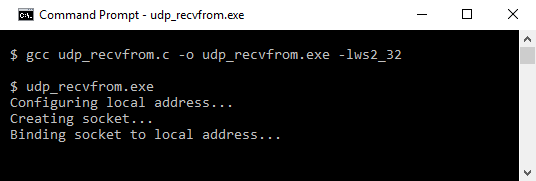We will start with the server, since we already have a usable UDP client, that is, udp_client.c.
Like all of our networked programs, we will begin by including the necessary headers, starting with the main() function, and initializing Winsock as follows:
/*udp_recvfrom.c*/
#include "chap04.h"
int main() {
#if defined(_WIN32)
WSADATA d;
if (WSAStartup(MAKEWORD(2, 2), &d)) {
fprintf(stderr, "Failed to initialize.\n");
return 1;
}
#endif
If you've been working through this book in order, this code should be very routine for you by now. If you haven't, then please refer to Chapter 2, Getting to Grips with Socket APIs.
Then, we must configure the local address that our server listens on. We use getaddrinfo() for this, as follows:
/*udp_recvfrom.c continued*/
printf("Configuring local address...\n");
struct addrinfo hints;
memset(&hints, 0, sizeof(hints));
hints.ai_family = AF_INET;
hints.ai_socktype = SOCK_DGRAM;
hints.ai_flags = AI_PASSIVE;
struct addrinfo *bind_address;
getaddrinfo(0, "8080", &hints, &bind_address);
This differs only slightly from how we've done it before. Notably, we set hints.ai_socktype = SOCK_DGRAM. Recall that SOCK_STREAM was used there for TCP connections. We are still setting hints.ai_family = AF_INET here. This makes our server listen for IPv4 connections. We could change that to AF_INET6 to make our server listen for IPv6 connections instead.
After we have our local address information, we can create the socket, as follows:
/*udp_recvfrom.c continued*/
printf("Creating socket...\n");
SOCKET socket_listen;
socket_listen = socket(bind_address->ai_family,
bind_address->ai_socktype, bind_address->ai_protocol);
if (!ISVALIDSOCKET(socket_listen)) {
fprintf(stderr, "socket() failed. (%d)\n", GETSOCKETERRNO());
return 1;
}
This code is exactly the same as in the TCP case. The call to socket() uses our address information from getaddrinfo() to create the proper type of socket.
We must then bind the new socket to the local address that we got from getaddrinfo(). This is as follows:
/*udp_recvfrom.c continued*/
printf("Binding socket to local address...\n");
if (bind(socket_listen,
bind_address->ai_addr, bind_address->ai_addrlen)) {
fprintf(stderr, "bind() failed. (%d)\n", GETSOCKETERRNO());
return 1;
}
freeaddrinfo(bind_address);
Again, that code is exactly the same as in the TCP case.
Here is where the UDP server diverges from the TCP server. Once the local address is bound, we can simply start to receive data. There is no need to call listen() or accept(). We listen for incoming data using recvfrom(), as shown here:
/*udp_recvfrom.c continued*/
struct sockaddr_storage client_address;
socklen_t client_len = sizeof(client_address);
char read[1024];
int bytes_received = recvfrom(socket_listen,
read, 1024,
0,
(struct sockaddr*) &client_address, &client_len);
In the previous code, we created a struct sockaddr_storage to store the client's address. We also defined socklen_t client_len to hold the address size. This keeps our code robust in the case that we change it from IPv4 to IPv6. Finally, we created a buffer, char read[1024], to store incoming data.
recvfrom() is used in a similar manner to recv(), except that it returns the sender's address, as well as the received data. You can think of recvfrom() as a combination of the TCP server accept() and recv().
Once we've received data, we can print it out. Keep in mind that the data may not be null terminated. It can be safely printed with the %.*s printf() format specifier, as shown in the following code:
/*udp_recvfrom.c continued*/
printf("Received (%d bytes): %.*s\n",
bytes_received, bytes_received, read);
It may also be useful to print the sender's address and port number. We can use the getnameinfo() function to convert this data into a printable string, as shown in the following code:
/*udp_recvfrom.c continued*/
printf("Remote address is: ");
char address_buffer[100];
char service_buffer[100];
getnameinfo(((struct sockaddr*)&client_address),
client_len,
address_buffer, sizeof(address_buffer),
service_buffer, sizeof(service_buffer),
NI_NUMERICHOST | NI_NUMERICSERV);
printf("%s %s\n", address_buffer, service_buffer);
The last argument to getnameinfo() (NI_NUMERICHOST | NI_NUMERICSERV) tells getnameinfo() that we want both the client address and port number to be in numeric form. Without this, it would attempt to return a hostname or protocol name if the port number matches a known protocol. If you do want a protocol name, pass in the NI_DGRAM flag to tell getnameinfo() that you're working on a UDP port. This is important for the few protocols that have different ports for TCP and UDP.
It's also worth noting that the client will rarely set its local port number explicitly. So, the port number returned here by getnameinfo() is likely to be a high number that's chosen randomly by the client's operating system. Even if the client did set its local port number, the port number we can see here might have been changed by network address translation (NAT).
In any case, if our server were to send data back, it would need to send it to the address and port stored in client_address. This would be done by passing client_address to sendto().
Once the data has been received, we'll end our simple UDP server by closing the connection, cleaning up Winsock, and ending the program:
/*udp_recvfrom.c continued*/
CLOSESOCKET(socket_listen);
#if defined(_WIN32)
WSACleanup();
#endif
printf("Finished.\n");
return 0;
}
You can compile and run udp_recvfrom.c on Linux and macOS by using the following commands:
gcc udp_recvfrom.c -o udp_recvfrom
./udp_recvfrom
Compiling and running on Windows with MinGW is done as follows:
gcc udp_recvfrom.c -o udp_recvfrom.exe -lws2_32
udp_recvfrom.exe
While running, it simply waits for an incoming connection:

You could use udp_client to connect to udp_recvfrom for testing, or you can implement udp_sendto, which we will do next.